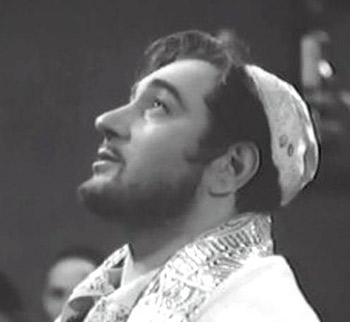Jewish Music Week is saluting Moishe Oysher, the cantor who brought jazz to Jewish liturgical music. Also a popular entertainer, Oysher starred in Yiddish movies and Yiddish theatre, performed on Yiddish radio, sang in concert halls and recorded several successful albums.
The Wonderful World of Moishe Oysher is a multi-media show that features Cantor Simon Spiro singing newly arranged selections from Oysher’s movies, concert appearances and cantorial and secular albums. Two singers will perform Oysher’s well-known nonsense song Halevai, which he recorded with the Barry Sisters, as part of a tribute to them.
This Jewish Music Week show also includes rare footage, stories about Oysher’s life and the 22-piece Moishe Oysher Big Band. Born in Moldova in 1907, Oysher, who was descended from six generations of cantors, had a Canadian connection. In 1921, he was on his way to Winnipeg to join his father when his voice broke. “As a child he was a wonderful boy soprano. His voice came back as a baritone,” Spiro said.
Oysher joined a Yiddish theatre company in Winnipeg when his voice came back, then he performed in Montreal’s Yiddish theatre. In the late 1920s, he was on Yiddish radio in Philadelphia and eventually he started his own theatre company. Back from a South American tour in the mid-1930s, he had trouble finding work in New York’s Yiddish theatre and was offered the position of cantor at the First American-Rumanian Synagogue in the Lower East Side.
“Being a cantor came very late in his career,” Spiro said. Oysher was a sensation at the synagogue, which became known as “the cantor’s Carnegie Hall.” But some members of the congregation balked at the idea of a vaudevillian leading them in prayer and some even revoked their memberships.
To silence the outcry, Oysher made an agreement with the board of rabbis: he would stay off the stage, but he would act in movies and would continue singing on Yiddish radio.
Spiro was 12 when he discovered Oysher on record, on three cantorial albums. Up until then, Spiro, an Elvis fan to this day, “had an aversion to listening to cantors,” he said. He added that listening to Oysher, the liturgy “just came alive. On record, his Dayenu blew my head apart on what could be done.”
Oysher liked the jazz style of singing and so he brought it to the cantorial liturgy, using similar rhythmic melodies in his prayers. “He was a scatter, the first Jewish scatter,” Spiro said. In his day, Oysher was compared to Louis Prima, who was known for his scat singing, but only Oysher “can sing the way he did,” Spiro said. “He was able to do these fluid scales because he was brought up in Romania and heard it from the Gypsies.”
Oysher, who died in 1958, was one of the first singers to step from the stage to the pulpit. Spiro, Beth Tzedec Congregation’s senior cantor, has also balanced dual careers in both cantorial and popular music.
“I led a double life, which Moishe Oysher did,” Spiro said. While Spiro performed as one of the regular BBC singers on national weekly radio in his native England, he was also a cantor at the St. John’s Wood Synagogue in London, then the seat of the Chief Rabbi of the British Empire.
“We had to keep it quiet for the more stuffy members of the synagogue,” Spiro said. Known as the “British Jazz Singer,” Spiro worked with Elton John, Faith Hill, Sheena Easton, Johnny Mathis, Kenny Rogers, Cliff Richard and Shania Twain, and he has had hit singles on Israeli and British pop charts. Twice he represented England in the Eurovision finals.
On the cantorial side, Spiro’s solo album, Traditional Cantorial and Concert Favorites, is one of the top-selling CDs in the Milken Archive of American Jewish Music catalogue.
The Wonderful World of Moishe Oysher will be presented at 7:30 p.m. on May 12 at the St. Lawrence Centre, Jane Mallett Theatre. For more information, visit www.jewishmusicweek.com.
